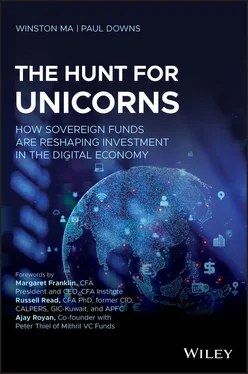1 ...8 9 10 12 13 14 ...17 Their rise is taking place at a time when governments become ever more active players in markets across the board. This chapter surveys the universe of sovereign investors from a comparative political economy perspective. We will introduce their little-known enormous capital power for global investments, looking at how each is cast in a role, and how many have responded to the crisis of today, those of the past, and are anticipating those of the future.
Understanding how these actors of gargantuan proportions are funded and assigned their missions is key to grasping the unique nature of their power in the world. It is important to understand that the funding source and motivation for creating a sovereign investment fund varies widely and has an impact on its operations, structure, and investment profile. Most funds, with increasingly broadened mandates from their home states, perform more than one of the functions outlined here; in countries like Nigeria, multiple sovereign funds are established for different policy objectives of savings, stabilization, and development (see Figure 1.2 ).
First, the most widely known SWF is the long-term savings fundfor the country's future generations (as such, also known as “ intergenerational funds”). Savings funds are often set up by commodity-rich countries to save a portion of their resource wealth for the future. (As the cases below illustrate, sometimes the future arrives sooner than expected. And in unexpected ways.) Oil, gas, and precious metal reserves are finite: one day they will run out. There is also a risk that these resources will become stranded assets as climate-change regulation and green-energy alternatives may render hydrocarbon extraction uneconomic.
Using their SWFs to convert today's resource wealth into renewable financial assets, governments can hope to share the windfalls of today with the generations of tomorrow. The world's oldest SWF, the Kuwait Investment Authority (KIA), is a good example, dating back to 1953. According to its website, it invests financial reserves to “[provide] an alternative to oil reserves, which would enable Kuwait's future generations to face the uncertainties ahead with greater confidence…”. Such uncertainties did arrive, with war and pandemics.
The fund for future generations of Kuwaitis did not have to wait for the oil to run out before it was called upon. After Kuwait had been sacked during the seven-month long Iraqi occupation in 1990, KIA provided over $85 billion (nearly $169 billion in 2020 dollars) to rebuild the Emirate. Its oilfields set ablaze by retreating Iraqi forces, the country was devastated in the wake of the occupation. With funds invested abroad for nearly four decades, the fund was at the ready to reconstruct its economy and physical infrastructure. And now, as recounted in Chapter 4, Kuwait sovereign funds are building, snug against the Iraqi border, a smart city of the future featuring a planned kilometer-high skyscraper.
The long-term savings funds of the oil-laden Gulf States also got the call to save the world a scant two decades later as the global financial crisis of 2008–2009 threatened to kill off the world's largest financial institutions and take the global economy with them. As we will explore in Chapter 8, KIA and ADIAof UAE in short order poured more than $10 billion into Citibank alone. And the Gulf States were not alone in riding to the rescue: CICof China put nearly $10 billion in Morgan Stanley, and Singapore's twin SIFs, GICand Temasek, dropped nearly $24 billion into Merrill Lynch, UBS, and (yes, again) Citibank (see Figure 1.1 ).
And now, as the coronavirus pandemic has rocked the world's financial markets, these economic superheroes are at it again. Amid the stock market turmoil, by early April 2020, Saudi Arabia's PIFhad spent well over $7 billion to pick up stakes in the battered oil majors of Europe, ENI, Equinor, and Royal Dutch Shell as well as others. The moves provoked a tightening of foreign investment restrictions in Italy, Germany, and Spain, exacerbating the tensions explored in Chapters 8 and 9(hugely different from the “white knight” cheers received during the previous global crisis).

Figure 1.1 SIFs to the Rescue of Citibank
Interestingly, PIF also laid out nearly $370 million to scoop over 8% of Carnival Cruises after the company's shares had plummeted over 75% due to the coronavirus pandemic and then over $500 million on a nearly 6% stake in similarly depressed live entertainment giant, LiveNation. Filling its pandemic shopping cart, PIF abandoned a £300 million purchase of English football club Newcastle United. As we will see in later chapters, PIF is instrumental in weaning the Kingdom's economy from its dependence on oil, with tourism as a focus. What looks like an opportunistic (or, from another viewpoint, perhaps even altruistic) move, is just as likely a move to serve the economic transformation.
Meanwhile, in the US, the economic dislocation has positioned the US to enact a $2 trillion stimulus package in 2020 known as the CARES Act. The legislation contemplates the US government owning shares in companies as a result of its bailout cash injections, a switch from its loan-based bailouts of the global financial crisis. Apparently anticipating voter demands that the taxpayers enjoy the potential corporate upside of the $2 trillion stimulus package, the Act mandates that, this time, loans include warrants, equity or participating senior debt. Only seen to a limited extent in the past (for example in the bailout of the US auto industry), the equity requirement is across all sectors and could result in the US government creating what is, in effect, a sovereign wealth fund.
Alaska already enjoys a SIF. In the pandemic, it is expected to disburse from its oil-funded coffers $3.1 billion, about 5% of its assets.
In addition, in a parallel to sovereign funds in many nations, the Federal Reserve, the US central bank, has been given a role as equity investor of last resort. The CARES Act provides for $454 billion fund for investment by the Federal Reserve. Within that fund is a facility specifically authorizing the Fed to purchase new security issuances in its efforts to maintain liquidity in markets. In this new age, Congress has not limited the facility to purchases of debt obligations. Yet, Janet Yellen, former Chair of the Federal Reserve, has argued for increasing the role of the Federal Reserve in capital markets even more, citing examples of other central banks like Japan that have broader authority to buy equity securities in the open market. When the world is facing down a global pandemic, the utility of sovereign investment funds becomes evident to the most seasoned observers.
The Dutch Disease was first diagnosed by The Economist in 1977, in reference to the economic conditions burdening the Netherlands after the discovery of large offshore natural gas deposits in the 1950s which were blamed for loss of competitiveness.
In connection with natural resource windfalls, currency appreciation can distort the local production economy, as exports become less competitive and labor shifts into the extractive industry. In the case of the Netherlands, unemployment soared from 1.1% to over 5% in the 1970s and investment moved abroad while gas exports surged.
Читать дальше













